|
|
Ensuring Compliance in International Shipping: Wood Packing (ISPM15) and Fumigation (BMSB)
When shipping goods overseas, compliance with regulations such as ISPM 15 and BMSB fumigation is crucial.
ISPM15 requires heat-treated or fumigated wood packaging to prevent the spread of pests worldwide. At the same time, treatment for BMSB (Brown Marmorated Stink Bug) is mandatory in certain countries to eliminate invasive species.
When working with an international shipping company, ensure that proper documentation and treatment are in place to avoid delays or penalties. While international shipping costs may increase due to these requirements, non-compliance risks costly rejections. Always verify regulations with your global logistics provider to guarantee smooth freight and protect your cargo from regulatory setbacks.
Wood-packing (ISPM15) and Fumigation (BMSB) in shipping from the USA
Important Notice to Any Cargo from the USA to Australia and New Zealand.
Each year, from September 1st through April 30th, during the Brown Marmorated Stink Bug (BMSB) season, international shipping companies will not load freight to Oceania without a valid fumigation certificate.
If a fumigation certificate is not provided:
- Cargo can be fumigated at the carrier’s facility.
- Typical treatment cost: $30 per Cubic Meter (~ 35 Cubic Feet), with a minimum of $150–$300 per shipment, depending on the carrier.
Please note that the treatment fee is not included in the price quotes when calculating international shipping costs using our online freight calculator. The carrier will add it separately to their sea freight cost.
If you choose to fumigate through the carrier:
- You must submit the carrier’s fumigation declaration, requesting that your load be fumigated.
- This must be done before delivering the cargo to the carrier’s freight terminal (CFS).
- We will include the declaration in the Shipper's Letter of Instructions (SLI).
Important: If your cargo is scheduled to arrive in Australia or New Zealand during the BMSB season and:
- You do not provide a valid fumigation certificate, and
- You decline carrier fumigation services,
Then we CANNOT process your shipment.
ISPM15 Rules for Shipping Cargo from the USA
Wood packing restrictions in international cargo transportation, also known as ISPM15 rules, apply to all freight containing lumber packaging materials. These regulations help prevent the spread of plant pests and diseases when transporting cargo using raw lumber packing materials.
These world regulations originated from the International Plant Protection Convention (IPPC - ippc.int) in March 2002 to standardize varying import restrictions on wood. The rules mainly apply to boxes, crates, and pallets containing lumber packaging material. The most restricted countries are Australia and New Zealand.
U.S. shippers should be aware that ISPM 15 requires that any cargo exporting from the U.S. overseas, using raw wood packaging, be fumigated or heat-treated before departure. This treatment eliminates insects and fungus.
Explaining ISPM 15 Marks
Since 2010, the United States has implemented IPPC rules for all freight entering and exiting the USA. Non-compliant cargo entering the U.S. requires immediate treatment or will be refused entry. All ISPM 15-compliant lumber packaging must bear the official IPPC mark, which replaces the need for a phytosanitary certificate.

Any wood packing treated in accordance with ISPM 15 must be branded with the official IPPC mark. This mark cancels the need for a phytosanitary certificate.
Non-compliant shipments arriving at destination ports may be confiscated, returned, or destroyed at the expense of the shipper or consignee. Destination officials may occasionally request fumigation certificates even for stamped packaging, so it's wise to consult with a global shipping company about documentation requirements.
Below are samples of IPPS stamps on wooden pallets used in global cargo transportation from the United States. The same stamps are required to ship boxes and crates containing lumber packing materials unless a fumigation certificate is attached.
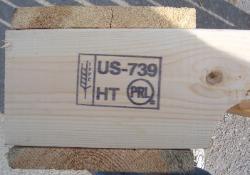
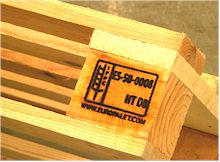
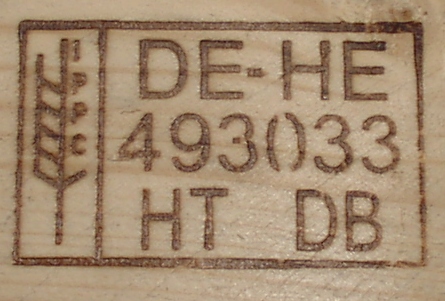
The ISPM15 stamp on boxes, crates, and pallets made from raw lumber indicates that the packaging has been heat-treated and complies with IPPC regulations.
Avoiding Problems IPPC when Moving Goods from the USA
The easiest way to avoid ISPM 15 issues is to use alternative materials:
- Certified ISPM15 or plastic pallets
- Cardboard, plywood, or veneer packaging
- Plastic supplies
When packing goods for international transportation from the U.S.:
- Cardboard boxes comply with ISPM15
- Heavy-duty boxes from retailers like U-Haul or Walmart are recommended
- Consider having carriers palletize loose boxes at their terminal (CFS) for $35-$50 per pallet. This transfers compliance responsibility to the international shipping company
For wooden pallets or crates:
- Use only ISPM15-certified and stamped materials
- Never use uncertified raw lumber
- Processed lumber products (plywood, particleboard) are generally exempt, but may require documentation.
ISPM 15 Compliance Guide
Understanding ISPM 15 regulations can help you save on international shipping costs. ISPM 15 rules apply only to your packaging materials, not your exporting goods. The key requirement is avoiding non-manufactured lumber packaging (like untreated pallets or crates). Instead, opt for ISPM15-certified wood with the official IPPC mark, plastic alternatives, or manufactured wood products, such as plywood and particleboard.
We recommend using heavy-duty cardboard boxes. When paired with certified pallets, these comply with ISPM15. Consider delivering loose boxes to your carrier's terminal (CFS) for even easier compliance. They'll handle proper palletization using compliant materials for about $35−50 per pallet. They will transfer the compliance responsibility to the transnational shipping company that handles your load, ensuring your shipment meets all requirements.
Non-compliance can significantly impact your international shipping costs, including delays, mandatory fumigation, or cargo destruction. Processed lumber materials, such as plywood, are generally exempt; however, complex crates may still require documentation. When wood packaging is necessary, always verify that the ISPM 15 certification stamp is visible and legible.
If you palletize cardboard boxes at CFS, they can provide certified pallets, stack boxes on the pallet, and shrink-wrap everything, so your load complies with wood-packing regulations and your shipment moves smoothly to its destination.
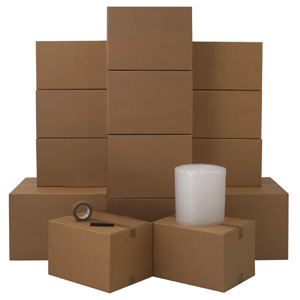
- If you decide to palletize your cardboard boxes on wooden pallets, use only ISPM 15-certified and stamped pallets. The same applies to crates. Never use uncertified raw wood packing materials. Failure to comply with ISPM 15 may result in increased international shipping costs, delays, or cargo rejection at the destination port.
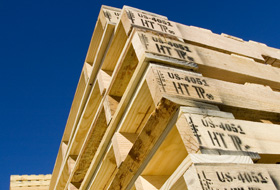
-
Lumber packaging wholly made of processed lumber-based products, such as plywood, particleboard, oriented strand board, or veneer created using glue, heat, pressure, or a combination thereof, should be considered sufficiently processed to eliminate the risk associated with the raw wood. It is unlikely to be infested by raw wood pests. Therefore, the ISPM 15 rules should not regulate and restrict it. However, if you ship a crate from the U.S., a complex crate may still require proof of compliance with ISPM 15, regardless of the shipping origin.
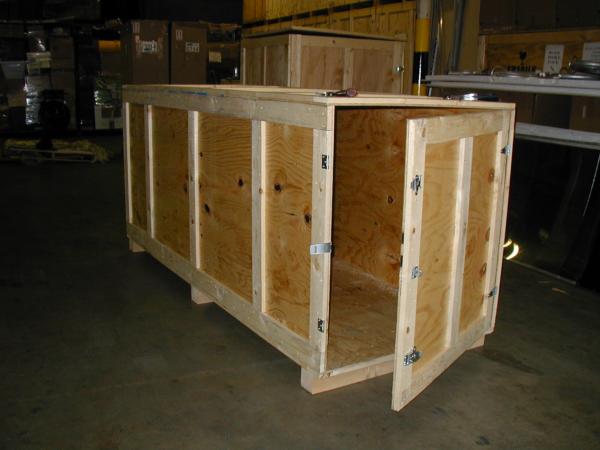
-
International freight from the U.S., packed in synthetic materials, is exempt from ISPM 15 regulations. If you ship goods stacked and stored on plastic pallets, cases, or crates, you do not need to worry about ISPM 15. Pallets, cases, and crates of various sizes and shapes, designed for international cargo transportation from the U.S. to overseas destinations, are widely available on the market.


ISPM 15 Documentation and Compliance Essentials
ISPM 15 compliance involves two critical components:
- Proper packaging of your global freight and
- Accurate documentation.
Before initiating international shipping from the United States, ensure that all ISPM 15-related paperwork is complete and available. Different countries enforce these regulations with varying degrees of strictness. Australia and New Zealand conduct comprehensive inspections, while transshipment hubs like Hong Kong and Singapore often require verification of documentation. The required forms may differ by destination country. U.S. freight forwarders should advise shippers on how to minimize the risk of compliance violations in global cargo transportation.
- When using lumber packaging, research your destination country's specific ISPM15 requirements well in advance. Consult with customs officials, brokers, or the U.S. consulate in the destination country for guidance. You can download the Australian wood packing declaration form for moving goods from the USA to Australia at this link.
- Consider working with professional packing services or international shipping companies for optimal compliance. These experts can advise on wood packaging restrictions and ensure that proper ISPM 15 documentation is maintained. Don't hesitate to ask them specific questions about compliance before finalizing your cargo transportation arrangements.
- Remember, delivering loose items to your carrier's terminal (CFS) remains one of the simplest ways to ensure compliance. The terminal staff will properly palletize your shipment using certified materials, handling both the physical packaging and necessary documentation.
BMSB Fumigation Requirements for Oceania-Bound Shipments
Since 2019, all ocean freight shipments departing from the USA to Oceania destinations during the Brown Marmorated Stink Bug (BMSB) season (September 1 through April 30 annually) must comply with strict requirements. International shipping companies cannot load any cargo during this period without a completed Fumigation Declaration, which we provide to shippers along with our instructions. This declaration must be submitted to the ocean freight carrier before loading. A licensed U.S. freight forwarder should guide customers in compliance.
Global sea freight carriers have established specific BMSB protocols for shipments from the USA to Oceania. These seasonal measures, designed to prevent the spread of invasive species, are detailed on the official websites of Australia's Department of Agriculture and Water Resources (DAWR) and New Zealand's Ministry of Primary Industries (MPI). Shippers should note that any costs associated with non-compliance, including mandatory onshore treatment in Australia or New Zealand, become the consignee's financial responsibility and can be substantial.
The regulations classify all shipments from high-risk origin countries, such as the United States, as potentially high-risk. For consolidated cargo (LCL shipments), if any shipment in a container is deemed high-risk, the entire container is automatically classified as such. This policy means international shipping companies must exercise caution when loading mixed consignments during the BMSB season.
Due to these strict requirements, global sea freight carriers now mandate that all shippers carefully assess their cargo against BMSB risk criteria before tendering shipments. Carriers require a signed declaration confirming this risk assessment before accepting any cargo for loading. This declaration process helps ensure affordable international shipping options remain available while maintaining biosecurity standards.
Typically, global ocean freight carriers will be providing fumigation services for LCL at load ports and gateways, and the following measures will be in effect:
- A completed BMSB form will be required for all shipments.
- For LCL shipments deemed HIGH RISK by the DAWR or MPI, a fee of $30-60 per Cubic Meter (~35 Cubic Feet) is typically applied, with a minimum fee of $150-$300 per shipment, depending on the carrier.
- Sulfuryl Fluoride will be the treatment used.
- If your shipment is deemed sensitive to fumigant and cannot be fumigated, global sea freight carriers may offer non-fumigated services, subject to availability.
…the fumigation certificate is incorrectly declared … Fumigation was completed over the weekend, and Quarantine released the container today. The cargo should be unpacked and available for collection within the next day or two. Please note that the sea freight will not be released until these charges are paid.
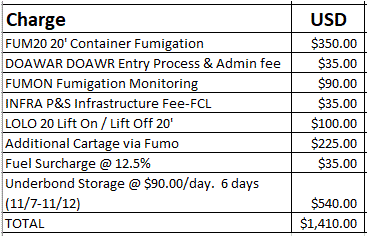
IF CARGO IS SCHEDULED TO ARRIVE IN AUSTRALIA OR NEW ZEALAND DURING THE BMSB SEASON, BUT SHIPPERS DO NOT PROVIDE A VALID FUMIGATION CERTIFICATE OR DECLINE TO FUMIGATE THEIR CARGO BY THE GLOBAL FREIGHT CARRIER, WE CANNOT SERVE SUCH SHIPMENTS.


.png)


